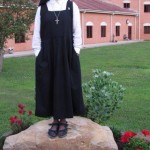Today is the memorial of my dear patron, teacher and friend, St. Philip Neri, whose chapel in Santa Maria in Vallicella (also called Chiesa Nuova) in Rome feels like a very natural and welcoming second home, for me — where I was able to participate, daily, in the mass on my last visit.
In her column, “A Word in Season” Pat Gohn takes a really wonderful look at this very great saint, whose “mission” was to the people of Rome; the churches and hospitals he built are still serving. The Oratory he founded saw one of his spiritual sons, Bl. John Henry Newman, beatified within the last year, and if you ask St. Philip to teach you what he knows, his first lesson will be a simple one: you’re not all that, so don’t take yourself too seriously. Be joyful, instead, in the Lord.
In her piece, Pat Gohn confesses to having a “fairly serious temperament” (which is not immediately apparent to anyone who has attended one of her fast-witted and amusing talks) which she suggests needs Philip’s example and exhortations to be of good cheer:
. . . my seventh grade homeroom teacher was fond of calling me out by saying: “You’ll catch more flies with honey than with vinegar, Missy.” […]St. Philip Neri’s wisdom was rooted in the delight he took in being a Child of God. Such a life was worthy of celebration and joy! Philip’s witness reminds me that a sad saint really is a sad saint. In other words, if God loves you and you know it, kindly inform your face!
Philip knew that, over time, the Christian needs to cultivate an attitude that was worthy of the long road to heaven:
Cheerfulness strengthens the heart and makes us persevere in a good life. Therefore, the servant of God ought always to be in good spirits.
As I studied his life, I learned the secret to his joyous and fun reputation: an intimate relationship with Jesus whom he addressed repeatedly and spontaneously with childlike confidence in the One who could supply all.
“Jesus, be a Jesus to me.”
“I cannot love you unless you help me, my Jesus.”
“My Jesus, if you want me, cut the fetters that keep me from you.”
As a young layman, Philip was searching for the higher things in life, drawn to a hermit’s lifestyle even as he lived and worked in the city. He found his peace in prayer and silence. He developed a deep love for Jesus, especially in the Eucharist. He was ardent about the efficacy of frequent confession, for it was the meeting place between Jesus’ mercy and the heart of men.
It really is a wonderful piece; Pat goes beyond talking of Philip’s renowned cheerfulness, into his mysticism, which is less-well known (as per Philip’s own reticence on the subject) but which was manifest within his physicality:
There were healings that flowed from the prayers of this man. Pressed against his chest, one could feel the warmth radiating from his heart and some felt what seemed to be a tumor-like bulge around his heart. It was something he tried to hide for most of his life . . .
In the year 1593, I was called upon because Philip was sick. I observed a strong heartbeat and was told that was something of long standing, which he had since his youth. As I looked for the cause and examined his chest, I found this to be very enlarged and a tumour there, by the small ribs next to the heart. By the touch I could tell the ribs were protruding . . . After his death the facts became clearer. On opening his breast, one found that the ribs at this location were broken, and the bones separated from the cartilage. In this way it was possible for the beating of his heart to have room to expand and contract. I came to the conclusion that this was something supernatural . . . It was the means by which God prevented his heart from destroying itself on the hard ribs in its violent beating. Thus he was able to live, even with this malady, an extraordinarily long life. (excerpted from Philip Neri, The Fire of Joy)
Philip had experienced a physical touch of God that both rearranged his life and perfected his calling. His prayer as he touched the Host was often: “Behold my love!” or, “Lord, keep your eye on me today. I fear I might betray you.”
There’s a lot of great stuff to glean from Pat’s piece, so do read it all. I believe you’ll come away from it with a desire to befriend this very great lover of Christ.
Related:
Get your Patron Saint for 2011
Images are mine










